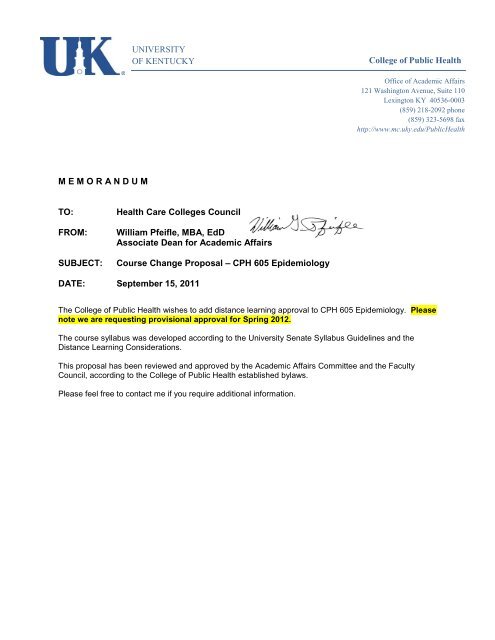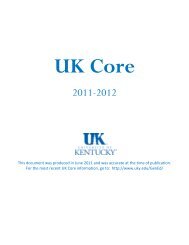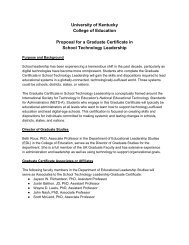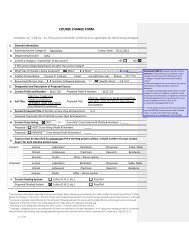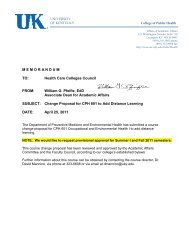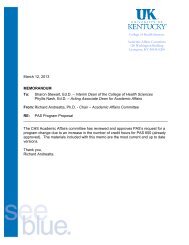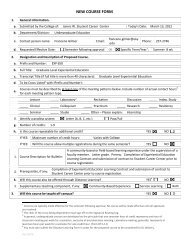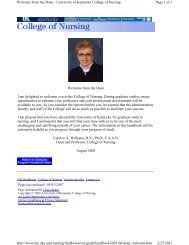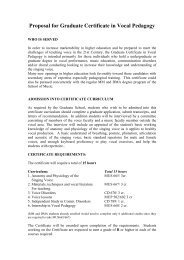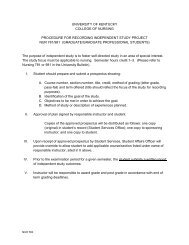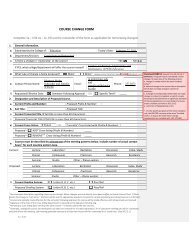CPH 605 - University of Kentucky
CPH 605 - University of Kentucky
CPH 605 - University of Kentucky
You also want an ePaper? Increase the reach of your titles
YUMPU automatically turns print PDFs into web optimized ePapers that Google loves.
UNIVERSITY<br />
OF KENTUCKY<br />
College <strong>of</strong> Public Health<br />
Office <strong>of</strong> Academic Affairs<br />
121 Washington Avenue, Suite 110<br />
Lexington KY 40536-0003<br />
(859) 218-2092 phone<br />
(859) 323-5698 fax<br />
http://www.mc.uky.edu/PublicHealth<br />
M E M O R A N D U M<br />
TO:<br />
FROM:<br />
SUBJECT:<br />
Health Care Colleges Council<br />
William Pfeifle, MBA, EdD<br />
Associate Dean for Academic Affairs<br />
Course Change Proposal – <strong>CPH</strong> <strong>605</strong> Epidemiology<br />
DATE: September 15, 2011<br />
The College <strong>of</strong> Public Health wishes to add distance learning approval to <strong>CPH</strong> <strong>605</strong> Epidemiology. Please<br />
note we are requesting provisional approval for Spring 2012.<br />
The course syllabus was developed according to the <strong>University</strong> Senate Syllabus Guidelines and the<br />
Distance Learning Considerations.<br />
This proposal has been reviewed and approved by the Academic Affairs Committee and the Faculty<br />
Council, according to the College <strong>of</strong> Public Health established bylaws.<br />
Please feel free to contact me if you require additional information.
COURSE CHANGE FORM<br />
Complete 1a – 1f &2a – 2c. Fill out the remainder <strong>of</strong> the form as applicable for items being changed.<br />
1. General Information<br />
a. Submitted by the College <strong>of</strong>: Public Health Today’s Date: 25 August 2011<br />
b. Department/Division: Epidemiology<br />
c. Is there a change in “ownership” <strong>of</strong> the course? YES NO<br />
If YES, what college/department will <strong>of</strong>fer the course instead?<br />
d. What type <strong>of</strong> change is being proposed? Major Minor 1<br />
e. Contact Person Name: Steven Fleming Email: Stflem2@uky.edu Phone: 218-2229<br />
f. Requested Effective Date: Semester Following Approval OR Specific Term 2 : Spring 2012<br />
2. Designation and Description <strong>of</strong> Proposed Course<br />
a. Current Prefix and Number: <strong>CPH</strong> <strong>605</strong> Proposed Prefix & Number: same<br />
b. Full Title: Epidemiology Proposed Title: same<br />
c. Current Transcript Title (if full title is more than 40 characters): same<br />
c. Proposed Transcript Title (if full title is more than 40 characters): same<br />
d. Current Cross-listing: N/A OR Currently Cross-listed with (Prefix & Number): N/A<br />
Proposed -<br />
Proposed -<br />
ADD Cross-listing (Prefix & Number):<br />
Remove 3,4 Cross-listing (Prefix & Number):<br />
e. Courses must be described by at least one <strong>of</strong> the meeting patterns below. Include number <strong>of</strong> actual contact<br />
hours 5 for each meeting and pattern type.<br />
Current: 45 Lecture Laboratory 5 Recitation Discussion Indep. Study<br />
Clinical Colloquium Practicum Research Residency<br />
Seminar Studio Other – Please explain:<br />
Proposed: 45 Lecture Laboratory Recitation Discussion Indep. Study<br />
Clinical Colloquium Practicum Research Residency<br />
Seminar Studio Other – Please explain: Distance Education<br />
f. Current Grading System: Letter (A, B, C, etc.) Pass/Fail<br />
Proposed Grading System: Letter (A, B, C, etc.) Pass/Fail<br />
g. Current number <strong>of</strong> credit hours: 3 Proposed number <strong>of</strong> credit hours: 3<br />
1 See comment description regarding minor course change. Minor changes are sent directly from dean’s <strong>of</strong>fice to Senate Council Chair. If Chair deems the change as<br />
“not minor,” the form will be sent to appropriate Council for normal processing and contact person is informed.<br />
2 Courses are typically made effective for the semester following approval. No course will be made effective until all approval are received.<br />
3 Signature <strong>of</strong> the chair <strong>of</strong> the cross-listing department is required on the Signature Routing Log.<br />
4 Removing a cross-listing does not drop the other course – it merely unlinks the two courses.<br />
5 Generally, undergrad courses are developed such that one semester hr <strong>of</strong> credit represents 1 hr <strong>of</strong> classroom meeting per wk for a semester, exclusive <strong>of</strong> any lab<br />
meeting. Lab meeting generally represents at least two hrs per wk for a semester for 1 credit hour. (See SR 5.2.1)<br />
Rev 8/09
COURSE CHANGE FORM<br />
h. Currently, is this course repeatable for additional credit? YES NO x<br />
Proposed to be repeatable for additional credit? YES NO x<br />
If YES:<br />
Maximum number <strong>of</strong> credit hours:<br />
If YES: Will this course allow multiple registrations during the same semester? YES NO<br />
i. Current Course Description for Bulletin:<br />
In this course students are taught the principles and methods <strong>of</strong> epidemiologic investigations, research methodology, and<br />
statistical integration. Major topics include etiologic factors <strong>of</strong> disease and injury, the distribution <strong>of</strong> health problems within<br />
populations, levels <strong>of</strong> prevention, and the concept <strong>of</strong> risk. The design <strong>of</strong> retrospective, cross-sectional and prospective studies<br />
are examined to illustrate odds ratio, relative risk, life tables, and person-years. Students are required to complete and submit<br />
a research proposal, present a topic paper, and serve as a co-facilitator for an article discussion<br />
Proposed Course Description for Bulletin:<br />
In this course students are taught the principles and methods <strong>of</strong> epidemiologic investigations, research methodology, and<br />
statistical integration. Major topics include etiologic factors <strong>of</strong> disease and injury, the distribution <strong>of</strong> health problems within<br />
populations, levels <strong>of</strong> prevention, and the concept <strong>of</strong> risk. The design <strong>of</strong> retrospective, cross-sectional and prospective studies<br />
are examined to illustrate odds ratio, relative risk, life tables, and person-years.<br />
j. Current Prerequisites, if any: none<br />
Proposed Prerequisites, if any:<br />
none<br />
k. Current Distance Learning (DL) Status: N/A Already approved for DL* Please Add 6 Please Drop<br />
*If already approved for DL, the Distance Learning Form must also be submitted unless the department affirms (by checking<br />
this box ) that the proposed changes do not affect DL delivery.<br />
I. Current Supplementary Teaching Component, if any: Community-Based Experience Service Learning Both<br />
Current Supplementary Teaching Component, if any: Community-Based Experience Service Learning Both<br />
3. Currently, is this course taught <strong>of</strong>f campus? YES NO x<br />
Proposed to be taught <strong>of</strong>f campus? YES NO x<br />
4. Are significant changes in content/teaching objectives <strong>of</strong> the course being proposed? YES NO x<br />
If YES, explain and <strong>of</strong>fer brief rationale:<br />
5. Course Relationship to Program(s)<br />
a. Are there other departments and/or programs that could be affected by the proposed change? YES NO<br />
If YES, identify the departments and/or programs:<br />
b. Will modifying this course result in a new requirement 7 for ANY program? YES NO<br />
If YES 7 , list the program(s) here:<br />
6. Information to be Placed on Syllabus.<br />
a. Check box if<br />
Changed to<br />
400G or 500<br />
If changed to 400G-or 500-level course you must send in a syllabus and you must include the<br />
differentiation between undergraduate and graduate students by: (i) requiring additional assignments by<br />
the graduate students; and/or (ii) establishing different grading criteria in the course for graduate<br />
students. (See SR 3.1.4)<br />
6 You must also submit the Distance Learning Form in order for the course to be considered for DL delivery.<br />
7 In order to change a program, a program change form must also be submitted.<br />
Rev 8/09
COURSE CHANGE FORM<br />
Signature Routing Log<br />
To Be Added by Academic Affairs prior to submission to HCCC<br />
General Information:<br />
Course Prefix and Number:<br />
<strong>CPH</strong> <strong>605</strong> Epidemiology<br />
Proposal Contact Person Name: Steve Fleming Phone: 218-2229 Email: Stflem2@uky.edu<br />
Becki Flanagan Phone: 218-2092 Email: becki@uky.edu<br />
INSTRUCTIONS:<br />
Identify the groups or individuals reviewing the proposal; note the date <strong>of</strong> approval; <strong>of</strong>fer a contact person for each<br />
entry; and obtain signature <strong>of</strong> person authorized to report approval.<br />
Internal College Approvals and Course Cross-listing Approvals:<br />
Reviewing Group Date Approved Contact Person (name/phone/email) Signature<br />
Department <strong>of</strong> Epidemiology 8-24-2011 Wayne Sanderson/218-2330/wsa223@uky.edu<br />
Academic Affairs Committee 9-6-2011 Mark Swanson/218-2060/mark.swanson@uky.edu<br />
Faculty Council 9-13-2011 Graham Rowles/218-0145/growl2@email.uky.edu<br />
Academic Dean 9-15-2011 William Pfeifle/218-2054/pfeifle@uky.edu<br />
External-to-College Approvals:<br />
Council<br />
Date<br />
Approved<br />
Signature<br />
Approval <strong>of</strong><br />
Revision 6<br />
Undergraduate Council<br />
Graduate Council<br />
Health Care Colleges Council<br />
Senate Council Approval<br />
<strong>University</strong> Senate Approval<br />
Comments:<br />
6 Councils use this space to indicate approval <strong>of</strong> revisions made subsequent to that council’s approval, if deemed necessary by the revising council.<br />
Rev 8/09
Distance Learning Form<br />
This form must accompany every submission <strong>of</strong> a new/change course form that requests distance learning delivery. This form<br />
may be required when changing a course already approved for DL delivery. All fields are required!<br />
Introduction/Definition: For the purposes <strong>of</strong> the Commission on Colleges, Southern Association <strong>of</strong> Colleges and<br />
Schools accreditation review, distance learning is defined as a formal education process in which the majority <strong>of</strong><br />
instruction (interaction between students and instructors and among students) in a course occurs when students<br />
and instructors are not in the same place. Instruction may be synchronous or asynchronous. A distance learning<br />
(DL) course may employ correspondence study or audio, video, or computer technologies.<br />
A number <strong>of</strong> specific requirements are listed for DL courses. The department proposing the change in delivery<br />
method is responsible for ensuring that the requirements below are satisfied at the individual course level. It is<br />
the responsibility <strong>of</strong> the instructor to have read and understood the university-level assurances regarding an<br />
equivalent experience for students utilizing DL (available at http://www.uky.edu/USC/New/forms.htm).<br />
Course Number and Prefix: <strong>CPH</strong> <strong>605</strong> Date: August 8, 2011<br />
Instructor Name: Steven T. Fleming<br />
Instructor email: stflem2@uky.ed<br />
Check the method below that best reflects how the majority <strong>of</strong> the course content will be delivered<br />
Internet/Web-based Interactive Video Hybrid<br />
Curriculum and Instruction<br />
1. How does this course provide for timely and appropriate interaction between students and faculty and among<br />
students? Does the course syllabus conform to <strong>University</strong> Senate Syllabus Guidelines, specifically the Distance<br />
Learning Considerations?<br />
In this hybrid course students will meet five times per semester in person, and will participate in BlackBoard<br />
discussions and interactive online learning experiences. The syllabus conforms to Senate guidelines.<br />
2. How do you ensure that the experience for a DL student is comparable to that <strong>of</strong> a classroom-based student’s<br />
experience? Aspects to explore: textbooks, course goals, assessment <strong>of</strong> student learning outcomes, etc.<br />
Textbooks, course goals, and assessments <strong>of</strong> students are identical to the experience in a traditional course.<br />
Students have the opportunity to interact with fellow students on a monthly basis.<br />
3. How is the integrity <strong>of</strong> student work ensured? Please speak to aspects such as password-protected course<br />
portals, proctors for exams at interactive video sites, academic <strong>of</strong>fense policy, etc.<br />
Students are required to login to BlackBoard for all course materials. Cheating and plagiarism policies are stated<br />
on the syllabus.<br />
4. Will <strong>of</strong>fering this course via DL result in at least 25% or at least 50%* (based on total credit hours required for<br />
completion) <strong>of</strong> a degree program being <strong>of</strong>fered via any form <strong>of</strong> DL, as defined above?<br />
No.<br />
If yes, what percentage and which program(s)?<br />
*As a general rule, if approval <strong>of</strong> a course for DL delivery results in 50% or more <strong>of</strong> a program being delivered through DL, the effective date <strong>of</strong> the course’s<br />
DL delivery will be six months from the date <strong>of</strong> approval.<br />
Revised 8/09<br />
Abbreviations: TAC – Teaching and Academic Support Center DL = distance learning DLP = Distance Learning Programs
Distance Learning Form<br />
5. How are students taking the course via DL assured <strong>of</strong> equivalent access to student services, similar to that <strong>of</strong> a<br />
student taking the class in a traditional classroom setting?<br />
Students taking this course via distance learning have access to the same services as students in a traditional<br />
classroom setting. They are given access to library services, CELT, and all course materials on BlackBoard. In<br />
addition, faculty are available by phone, email, or in person for consultation. Students are also given contact<br />
information for the BlackBoard help desk and CELT support services.<br />
Library and Learning Resources<br />
6. How do course requirements ensure that students make appropriate use <strong>of</strong> learning resources?<br />
Course requirements make it mandatory for students to use BlackBoard for electronic discussions, problem sets,<br />
course documents, and submission <strong>of</strong> assignments to successfully complete this course.<br />
7. Please explain specifically how access is provided to laboratories, facilities, and equipment appropriate to the<br />
course or program.<br />
All students are provided with a LinkBlue account which is used to connect to critical campus resources,<br />
such as email, online library services, and BlackBoard.<br />
Student Services<br />
8. How are students informed <strong>of</strong> procedures for resolving technical complaints? Does the syllabus list the entities<br />
available to <strong>of</strong>fer technical help with the delivery and/or receipt <strong>of</strong> the course, such as the Teaching and<br />
Academic Support Center (http://www.uky.edu/TASC/index.php) and the Information Technology Customer<br />
Service Center (http://www.uky.edu/UKIT/)?<br />
9. Will the course be delivered via services available through the Teaching and Academic Support Center?<br />
Yes<br />
No<br />
If no, explain how students enrolled in DL courses are able to use the technology employed, as well as how<br />
students will be provided with assistance in using the technology.<br />
Revised 8/09<br />
Abbreviations: TAC – Teaching and Academic Support Center DL = distance learning DLP = Distance Learning Programs
Distance Learning Form<br />
10. Does the syllabus contain all the required components below? Yes No<br />
Instructor’s virtual <strong>of</strong>fice hours, if any.<br />
The technological requirements for the course.<br />
Contact information for:<br />
TASC http://www.uky.edu/TASC/index.php<br />
Information Technology Customer Service Center<br />
http://www.uky.edu/UKIT/<br />
Procedure for resolving technical complaints.<br />
Preferred method for reaching instructor (email, phone, text message).<br />
Maximum timeframe for responding to student communications.<br />
Language pertaining to academic accommodations:<br />
If you have a documented disability that requires academic accommodations in this course, please make<br />
your request to the <strong>University</strong> Disability Resource Center. The Center will require current disability<br />
documentation. When accommodations are approved, the Center will provide me with a Letter <strong>of</strong><br />
Accommodation which details the recommended accommodations. Contact the Disability Resource<br />
Center, Jake Karnes, Director, at 859-257-2754 or jkarnes@email.uky.edu.<br />
Information on Distance Learning Library Services (http://www.uky.edu/Libraries/DLLS)<br />
• Carla Cantagallo, DL Library<br />
• Local phone: 859-257-0500 ext 2171; Long distance phone: 800-828-0439, option #6<br />
• Email: dllservice@email.uky.edu<br />
• DL Interlibrary Loan Service: http://www.uky.edu/Libraries/libpage.php?web_id=253&llib_id=16<br />
11. As the instructor <strong>of</strong> record, I have read and understood all <strong>of</strong> the university-level statements regarding Distance<br />
Learning.<br />
Instructor Name: Steven T. Fleming<br />
Instructor Signature:<br />
Revised 8/09<br />
Abbreviations: TAC – Teaching and Academic Support Center DL = distance learning DLP = Distance Learning Programs
<strong>University</strong> <strong>of</strong> <strong>Kentucky</strong> College <strong>of</strong> Public Health<br />
<strong>CPH</strong>-<strong>605</strong>-002: Introduction to Epidemiology<br />
Winter 2012<br />
Course Access/Class Time and Location:<br />
This is an online course. To access the course visit http://elearning.uky.edu and login to<br />
Blackboard with your LINK BLUE username and password.<br />
Instructor: Steven Fleming, PhD<br />
Office phone: 859-218-2229<br />
Office address: 121 Washington Avenue, Room 213C<br />
UK e-mail address: My e-mail address is stflem2@uky.edu. This is the best way to contact me.<br />
Please use the Send Email option in Blackboard. This tool automatically puts the course<br />
number in the subject line. This will help facilitate a quicker response from me.<br />
Course Developer: Steven Fleming<br />
Virtual Office Hours<br />
Generally, the fastest way to contact me is through email. I will respond within 24 hours. For<br />
face-to-face, telephone, or SKYPE appointments: please e-mail me to set up a meeting time.<br />
Course Description:<br />
This course describes the concepts and principles <strong>of</strong> epidemiology, which is the distribution and<br />
determinants <strong>of</strong> disease in human populations. The purpose is to describe epidemiology as a set<br />
<strong>of</strong> tools for clinical or managerial decision-making. The course includes discussions <strong>of</strong> the<br />
theory and methods <strong>of</strong> epidemiology, including key concepts such as incidence, prevalence,<br />
mortality, morbidity, risk, exposure and the interaction <strong>of</strong> agent, host, environment across the<br />
constructs <strong>of</strong> time, person, and place. The course also expostulates the basic types <strong>of</strong><br />
epidemiologic investigation (retrospective and prospective observational studies and<br />
experimental designs) and distinctive features/problems associated with these designs such as<br />
relative risk, odds ratio, sensitivity, specificity, and various types <strong>of</strong> bias.<br />
Student Learning Outcomes:<br />
In relationship to the MPH degree, this course contributes toward fulfillment <strong>of</strong> the following<br />
terminal objectives for students concentrating in epidemiology.<br />
1. Explain the purposes and applications <strong>of</strong> epidemiology.<br />
2. Search and/or critically review the epidemiology literature.<br />
3. Identify and use appropriate epidemiology study designs & principles.<br />
4. Collect and manage data for investigating epidemiology issues<br />
5. Analyze epidemiological data using appropriate statistical methods.<br />
6. Interpret and clearly communicate findings.<br />
7. Assess the ethical issues that confront epidemiology and appropriately address these<br />
issues.<br />
8. Integrate principles <strong>of</strong> epidemiology into the practice <strong>of</strong> public health.
In relationship to the Dr.P.H. degree, this course contributes toward fulfillment <strong>of</strong> the following<br />
terminal objectives for students concentrating in epidemiology.<br />
1. Explain and apply the principles and methods <strong>of</strong> epidemiology in a wide variety <strong>of</strong><br />
clinical, community, environmental and public health situations.<br />
2. Search, critically review, and synthesize and interpret the epidemiologic and public<br />
health literature to impact public health policy.<br />
3. Identify and employ appropriate epidemiologic study designs to develop fundable<br />
epidemiologic and public health programs.<br />
4. Direct the collection, compilation, and management <strong>of</strong> epidemiologic data for<br />
surveillance and investigation <strong>of</strong> epidemiologic issues.<br />
5. Direct the analysis <strong>of</strong> epidemiologic data using advanced statistical methods.<br />
6. Interpret and clearly communicate complicated epidemiological findings to<br />
collaborators, legislators, administrators, and the public to effect public health<br />
policy.<br />
7. Summarize and assess ethical issues that confront epidemiology and public health<br />
and integrate appropriate strategies to resolve those issues.<br />
8. Effectively lead, educate, and mentor students, coalitions, clinicians, legislators,<br />
administrators, public health practitioners, and other persons to utilize<br />
epidemiological data, methods and findings to impact public health and public health<br />
practice.<br />
Course Goals/Objectives:<br />
After completion <strong>of</strong> this course in Introduction to Epidemiology the student will be able to:<br />
1. Explain the purpose and application <strong>of</strong> epidemiology, and differentiate between a clinical<br />
and an epidemiological approach to disease and prevention.<br />
2. Identify the contributions <strong>of</strong> biology, statistics, demography, and sociology as they relate to<br />
the science <strong>of</strong> epidemiology.<br />
3. Demonstrate an understanding <strong>of</strong> how data are collected, grouped and analyzed in<br />
epidemiologic studies, including the incidence and prevalence <strong>of</strong> disease and mortality rate<br />
standardization.<br />
4. Identify and use appropriate epidemiological principles and study designs in the<br />
interpretation <strong>of</strong> epidemiologic investigations and in the formulation <strong>of</strong> epidemiologic<br />
research questions.<br />
5. Differentiate between the following study designs in terms <strong>of</strong> validity, cost, bias,<br />
advantages and disadvantages. (a) cross-sectional studies; (b) ecologic studies (c)<br />
case-control; (d) cohort; (e) randomized clinical trials; and (f) community trials.<br />
6. Identify sources <strong>of</strong> confounding, bias, and effect modification in epidemiological studies<br />
7. Assess the ethical issues and procedures that are confronted in the conduct <strong>of</strong><br />
epidemiologic studies<br />
This course relates directly to the accomplishment <strong>of</strong> the educational program goals for the<br />
M.P.H. and Dr.P.H. degrees. The MPH goal and objectives are described in the Student<br />
Handbook which students received upon enrollment into the MPH degree program. Similarly,<br />
the Dr.P.H. goal and objectives are described in the Student Handbook which students receive
upon enrollment into the Dr.P.H. degree program. Please reference the appropriate educational<br />
program goals throughout the semester, as they will provide a framework for this course and as<br />
such will contribute to your preparation for successfully completing other degree program<br />
requirements (e.g., capstone, practicum, and Dr.P.H. comprehensive examination).<br />
Required Course Readings/Viewing Materials:<br />
Required Text:<br />
Gordis L, Epidemiology (4 rd Edition). Philadelphia: W.B. Saunders Company, 2009.<br />
Other Recommended (reference) epidemiology books:<br />
1) Rothman, KJ. Epidemiology: An Introduction. New York: Oxford UP, 2002<br />
2) Last, JM ed. A Dictionary <strong>of</strong> Epidemiology (4 th Ed.). New York: Oxford UP, 2001.<br />
3) Aschengrau, A. & Seage GR. Essentials <strong>of</strong> Epidemiology in Public Health. Sudbury:<br />
Jones and Bartlett Publishers, 2003.<br />
4) Timmreck TC, An Introduction to Epidemiology (3 rd Ed.). Boston: Jones and Bartlett,<br />
2002.<br />
5) Garrett, Laurie, The Coming Plague, NewYork: Penguin Books, 1995.<br />
Books may be purchased from the following stores.<br />
• Kennedy Bookstore, 405 S. Limestone, (859) 252-0331<br />
Or go to the website: http://www.kennedys.com<br />
• Wildcat Text Books, 563 S. Limestone, (859) 225-7771<br />
or go to the website: http://www.wildcattext.com<br />
• UK Bookstore 106 Student Center Annex, (859) 859-218-22276304<br />
or go to the website: http://www.uk.bkstr.com<br />
You can also purchase textbooks through any <strong>of</strong> the Internet bookstores, but you will need to<br />
rush shipping for them because you will need the book when classes begin.<br />
Additional readings (articles, book chapters, news media, films, videos, etc) will be required as<br />
well, but will be made available through E-reserves through the UK library, the UK full text online<br />
articles services, through the course content section <strong>of</strong> Blackboard, and through Internet<br />
sources. Specific texts are listed in the reading / assignment schedule.<br />
Minimum Technology Requirements:<br />
Complete the following steps to make sure your computer is correctly configured and the<br />
necessary s<strong>of</strong>tware is installed. Note: You will not be able to access course material if you<br />
fail to complete these steps.<br />
1. Go to this site to check the minimum hardware, s<strong>of</strong>tware and browser<br />
requirements:http://wiki.uky.edu/blackboard/Wiki%20Pages/Bb9%20Hardware%20and<br />
%20S<strong>of</strong>tware%20Requirements.aspx<br />
2. Internet Explorer is NOT recommended for Blackboard. Firefox is the recommended<br />
Internet browser for the course. Go to https://download.uky.edu/ to download a free<br />
version <strong>of</strong> Firefox. Log in with your LINK BLUE id and password and search for Firefox.
3. Go to http://java.com and click on the Free Java Download button. Run the installer<br />
to get the latest version.<br />
4. You will also need Flash, Adobe Acrobat Reader and QuickTime movie player. Go<br />
to http://wiki.uky.edu/blackboard/Wiki%20Pages/Browser%20Check.aspx then click<br />
BbGO! If you do not have these installed, you can download them from this site.<br />
5. To download Windows Media Player, click this link:<br />
http://www.micros<strong>of</strong>t.com/windows/windowsmedia/player/10/default.aspx<br />
6. Students and faculty can download Micros<strong>of</strong>t Office Suite (including Word and<br />
PowerPoint) from this site: https://download.uky.edu/.<br />
If you experience technical difficulties contact the Customer Service Center at 859-218-HELP<br />
(4357) or by e-mail at helpdesk@uky.edu. Please also inform the course instructor when you<br />
are having technical difficulties.<br />
Bb 101 for First-Time Online Students<br />
This is a brief introduction for students using Blackboard for the first time.<br />
● Go to http://elearning.uky.edu and log in with your Link Blue ID.<br />
● Click on the Courses link near the top left <strong>of</strong> the page (to the right <strong>of</strong> My Bb and under<br />
the Library tab).<br />
● In the Course Search line, type Bb9-101 (exactly as you see it there, including the<br />
hyphen).<br />
● Find the Course ID (first column) Bb9-101-OnLine-Stu, and click the down arrow next to<br />
the Course ID. Click Enroll then Submit.<br />
Grading:<br />
Midterm Exam 30%<br />
Final Exam 30%<br />
Problem Sets (8 total)<br />
40% (5% each)<br />
Total: 100%<br />
Final grades will be will be assigned as follows:<br />
A = 100-90<br />
B = 89-80<br />
C = 79-70<br />
E/Fail = 69% and below<br />
You can review your scores by going to MY GRADES in Blackboard (click on TOOLS first).<br />
All assignments must be submitted online. Assignments sent via e-mail will not be<br />
accepted/graded. If you have problems submitting an assignment, it is your responsibility to let<br />
your instructor know. Written assignments MUST be submitted as Micros<strong>of</strong>t Word files unless<br />
otherwise noted. All filenames should use only alpha-numeric characters (a-z, 0-9) before the<br />
file extension (example .doc or .docx). Example: SamAdamsEssay2.doc . Blackboard does not<br />
accept file names with characters like !@#$%.
Examination Information:<br />
The midterm and final examinations will be given during the face-to-face sessions.<br />
Policy on Academic Accommodations:<br />
If you have a documented disability that requires academic accommodations in this course,<br />
please make your request to the <strong>University</strong> Disability Resource Center<br />
http://www.uky.edu/StudentAffairs/DisabilityResourceCenter/index.html. The center will require<br />
current disability documentation. When accommodations are approved, the Center will provide<br />
you with a Letter <strong>of</strong> Accommodation which details the recommended accommodations. In order<br />
to receive accommodations in this course, you must provide me with a Letter <strong>of</strong> Accommodation<br />
from the Disability Resource Center (Room 2, Alumni Gym, 859-218-22272754). Contact the<br />
DRC Director Jake Karnes 859.257.2754 or jkarnes@email.uky.edu.<br />
Attendance<br />
All course materials are online and it is YOUR responsibility to access material in a timely<br />
manner. To help keep you on track I have provided a Course Schedule that you should follow.<br />
The schedule is at the end <strong>of</strong> this syllabus and also in the UNITS tab on Blackboard.<br />
You are expected to spend a minimum <strong>of</strong> 5 hours per week working with the course material<br />
(including reading, writing, interacting with other students in the course, etc).<br />
Excused Absence/ Make-up opportunities<br />
Late assignments will be accepted only in the event <strong>of</strong> documented excused inability/absences<br />
as defined by <strong>University</strong> Senate Rules V, 2.4.2. Problems associated with your computer,<br />
procrastination, or forgetfulness are not acceptable excuses for late submission <strong>of</strong> assignments.<br />
It is YOUR responsibility to make sure that you access and submit assignments on time. Note:<br />
Once the deadline for submission has passed, these assignments will no longer be accessible<br />
on Blackboard.<br />
Academic Integrity, Cheating and Plagiarism<br />
PLAGIARISM and CHEATING are serious academic <strong>of</strong>fenses.<br />
The following is an excerpt taken from the "Students Rights and Responsibilities Handbook,<br />
<strong>University</strong> <strong>of</strong> <strong>Kentucky</strong>" regarding cheating.<br />
"Cheating is defined by its general usage. It includes, but is not limited to, the wrongful<br />
giving, taking, or presenting any information or material by a student with the intent <strong>of</strong><br />
aiding himself/herself or another on any academic work which is considered in any way<br />
in the determination <strong>of</strong> the final grade."<br />
The following is an excerpt taken from the "Students Rights and Responsibilities Handbook,<br />
<strong>University</strong> <strong>of</strong> <strong>Kentucky</strong>" regarding plagiarism.<br />
"All academic work, written or otherwise, submitted by students to their instructors or<br />
other academic supervisors, is expected to be the result <strong>of</strong> their own thought, research,<br />
or self-expression.<br />
When students submit work purporting to be their own, but which in any way borrows<br />
ideas, organization, wording or anything else from another source without appropriate<br />
acknowledgment <strong>of</strong> the fact, the students are guilty <strong>of</strong> plagiarism.<br />
Plagiarism includes reproducing someone else's work........ If the words <strong>of</strong> someone else<br />
are used, the student MUST put quotation marks around the passage in question and add<br />
an appropriate indication <strong>of</strong> its origin. Making simple changes while leaving the<br />
organization, content and phraseology intact is plagiaristic."<br />
Charges <strong>of</strong> an academic <strong>of</strong>fense will be made against any student that cheats or commits<br />
plagiarism. Penalties for such an <strong>of</strong>fense will be assessed according to <strong>University</strong> Regulations
egarding Academic Offenses. The most severe penalties include suspension or dismissal from<br />
the <strong>University</strong>. I have a zero-tolerance policy regarding academic <strong>of</strong>fenses.<br />
NOTE* In addition to the circumstances listed above, the following activities are considered<br />
evidence <strong>of</strong> cheating:<br />
1) Any talking to another student during an examination.<br />
2) Looking at another students’ work during an examination, or allowing another student to look<br />
at your work.<br />
3) Collaborating with another student on an examination and/or submitting an assignment that is<br />
similar in wording or sentence construction to the work <strong>of</strong> another student in the class, unless<br />
the assignment has been identified as a group assignment.<br />
Distance Learning Library Services<br />
(http://www.uky.edu/Libraries/DLLS)<br />
● Carla Cantagallo, DL Librarian, Email: dlservice@email.uky.edu<br />
● Local phone number: 859. 257.0500, ext. 2171;<br />
● Long-distance phone number: (800) 828-0439 (option #6)<br />
Appropriate Online Behavior:<br />
Students are expected to maintain decorum that includes respect for other students and the<br />
instructor, to regularly log in to the course, and to display an attitude that seeks to take full<br />
advantage <strong>of</strong> the educational opportunity. All students are expected to be prepared to work and<br />
actively participate in class activities.<br />
Virtual communication and discussion "in cyberspace" occur in a social environment where<br />
normal rules <strong>of</strong> social interaction apply. The remoteness <strong>of</strong> the recipients is no excuse to<br />
behave in an anti-social manner and post unacceptable messages.<br />
Unacceptable messages include those that harass, intimidate, threaten, belittle, ridicule,<br />
expressed hatred for, or aggression toward others. Let us be mindful to avoid words that imply<br />
that some groups <strong>of</strong> people are less worthy than others (e.g., avoid racist, sexist, anti-Semitic,<br />
age-ist, and homophobic language).<br />
Discussion board and other electronic communication for this course should relate only to the<br />
course subject matter, generally respond to the instructor threads, and always seek to further<br />
the aims <strong>of</strong> that particular discussion forum or chat session (e.g., stay on topic).<br />
Contributions to discussion boards and synchronous chat are the intellectual property <strong>of</strong> the<br />
authors. Students who quote another person in class projects, publications or even in remarks<br />
made on the discussion board should always acknowledge the source <strong>of</strong> that quote (e.g., do not<br />
plagiarize your classmates).<br />
Personal comments about other users and their views should not be placed in any <strong>of</strong> our<br />
Blackboard course areas that are viewable by other users.<br />
Do not copy private messages to another person without the author's explicit permission.<br />
Consult the UK Student Rights and Responsibilities regarding the steps for addressing<br />
unresolved academic issues at http://www.uky.edu/StudentAffairs/Code/part2.html
Course Schedule/Outline:<br />
All course assignments are due by 5:00 PM Eastern Time on Friday.<br />
Week/Module Topic Readings Assignments<br />
One<br />
● Description <strong>of</strong> the course Gordis Chapter 1<br />
● Introduction and overview<br />
● Terms and definitions<br />
● Objectives <strong>of</strong> epidemiology<br />
● Epidemiologic approach<br />
● Prevention<br />
Two<br />
History <strong>of</strong> epidemiology<br />
Gordis Chapter 2<br />
● Hippocrates<br />
● John Snow<br />
● Edward Jenner<br />
● James Lind<br />
● Benjamin Jesty<br />
● Typhoid Mary<br />
● Tuskegee Syphilis Study<br />
● Framingham Study<br />
Three Disease transmission<br />
Gordis Chapter 2<br />
● Modes <strong>of</strong> transmission<br />
● Clinical/subclinical disease<br />
● Endemic/epidemic/pandemic<br />
● Disease outbreaks<br />
● Herd immunity<br />
● Incubation period<br />
● Outbreak investigation<br />
Four<br />
Measures I<br />
Gordis Chapter 3 Problem Set #1 due<br />
● Morbidity<br />
● Incidence<br />
● Prevalence<br />
● Measures <strong>of</strong> association<br />
● Measures <strong>of</strong> impact<br />
Five<br />
Measures II<br />
Gordis Chapter 4 Problem Set #2 due<br />
● Kinds <strong>of</strong> mortality rates<br />
● Direct Standardization<br />
● indirect Standardization<br />
Six<br />
Diagnostic and Screening Tests Gordis Chapter 5,18 Problem Set #3 due<br />
● Sensitivity<br />
● Specificity<br />
● Predictive Value<br />
● Two-stage testing<br />
● Simultaneous testing<br />
Seven Review and Study for Mid-term Gordis Chapter 18 Mid-term Exam<br />
Eight<br />
Overview <strong>of</strong> study design and<br />
causal inferences<br />
● Association and causality<br />
● necessary/sufficient conditions<br />
● Causality guidelines<br />
Gordis Chapter 14
Nine<br />
Ten<br />
Eleven<br />
Twelve<br />
Thirteen<br />
● Simultaneous testing<br />
Cohort studies<br />
● Design <strong>of</strong> cohort studies<br />
● Types <strong>of</strong> cohort studies<br />
● Relative risk<br />
● Risk difference<br />
● Attributable risk<br />
● Risk difference<br />
Case-Control Studies<br />
● Design <strong>of</strong> case-control studies<br />
● Selection <strong>of</strong> cases and controls<br />
● Types <strong>of</strong> controls<br />
● Odds ratio<br />
● Case-cohort study<br />
● Nested case-control<br />
Cross Sectional and Ecological<br />
Studies<br />
● Design <strong>of</strong> these studies<br />
● Measures <strong>of</strong> comparison<br />
● Ecologic fallacy<br />
Randomized Controlled Trials<br />
● Selection <strong>of</strong> subjects<br />
● Randomization<br />
● Masking/blinding<br />
● Cross-over<br />
● Factorial design<br />
Bias/ Confounding and Effect<br />
Modification<br />
● Confounding<br />
● Selection bias<br />
● Misclassification bias<br />
● Effect modification<br />
Gordis Chapter<br />
9,11,12<br />
Gordis Chapter<br />
10,11,13<br />
Problem Set #4 due<br />
Problem Set #5 due<br />
Gordis Chapters 10-13 Problem Set #6 due<br />
Gordis Chapters 7,8<br />
Gordis Chapter 15<br />
Problem Set #7 due<br />
Problem Set #8 due<br />
Fourteen Review and study for Final Final Exam<br />
*The course instructor remains the right to modify or adapt this outline to meet the needs <strong>of</strong> the<br />
class. Adequate notice will be given <strong>of</strong> any change.
Topic Outline for Class Meeting Dates:<br />
Month Day Date Topic<br />
One Thursday 1/12/12 Descriptive epidemiology I<br />
● Introduction<br />
● Disease transmission<br />
● Measures <strong>of</strong> frequency: Incidence and prevalence<br />
● Measures <strong>of</strong> association: ratio and difference<br />
● Measures <strong>of</strong> impact<br />
Two Thursday 2/9/12 Descriptive epidemiology II and measuring morbidity<br />
● Direct and indirect standardization <strong>of</strong> mortality rates<br />
● Diagnostic and screening tests<br />
Three Thursday 3/8/12 Mid-term exam, overview <strong>of</strong> study design<br />
● Bradford-Hill Criteria for Causality<br />
● Overview <strong>of</strong> study designs<br />
Four Thursday 4/5/12 Studies designs and Bias<br />
● Case-Control, cohort, randomized controlled trial, crosssectional,<br />
and ecologic studies<br />
● Selection, misclassification bias, and other biases<br />
● Confounding and effect modification<br />
Five Thursday 4/26/12 Review for final and Final Exam.<br />
The lecture schedule is subject to change. Students will be given notice in the event that a<br />
change needs to be made to the schedule


